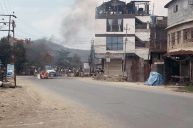Lieutenant General Sumer Ivan D’Cunha, the Director General of Army Air Defence, said that India has strong military power and can hit targets anywhere inside Pakistan. He mentioned “Operation Sindoor” as an example.
Lieutenant General Sumer Ivan D’Cunha also said that even if Pakistan moves its army headquarters from Rawalpindi to places like Khyber Pakhtunkhwa (KPK), it will still need to “find a deep hole” to hide.
During Operation Sindoor, India carried out strong attacks on important Pakistani airbases. These strikes used loitering munitions to accurately destroy valuable targets.
India Can Target Entire Pakistan, Says Army Air Defence Chief
“I just like to say that India has an adequate arsenal of weapons to take on Pakistan right across its depth. So, from its broadest to its narrowest, wherever it is, the whole of Pakistan is within range. We are absolutely capable, from our borders or even in depth, where we can take on the entire Pakistan,” Lt Gen D’Cunha said in the interview.
Lieutenant General D’Cunha added, “And the GHQ can move from Rawalpindi to KPK or wherever they want to move, but they are all within range, so they will have to really find a deep hole.”
He also said that the success of the operation was made possible by modern Indian-made technology, such as long-range drones and guided weapons.
India Thwarted Pakistan’s Massive 1,000-Drone Attack: Lt Gen D’Cunha
D’Cunha said that Pakistan sent about 800 to 1,000 drones over the western border in just four days. He said the Indian Army, Navy, and Air Force together to stop the attack and were able to destroy many of the drones.
He confirmed that all the drones carrying weapons were shot down and no civilians were hunt. In an interview with ANI, he talked about how the three branches of the military teamed up to defend against both drone and missile attacks.
“..I would say anything between 800-1000 across the whole western border in four days. A large number of them were destroyed. One thing for sure is that all the Unmanned Combat Aerial Vehicles [UCAV] which carried a payload, although they intended to harm our civilian population and they were directed towards population centres, we ensured that they did not cause any damage, and I think the proof of the pudding is actually in what we actually saw, that there were no civilian casualties…” D’Cunha said.












